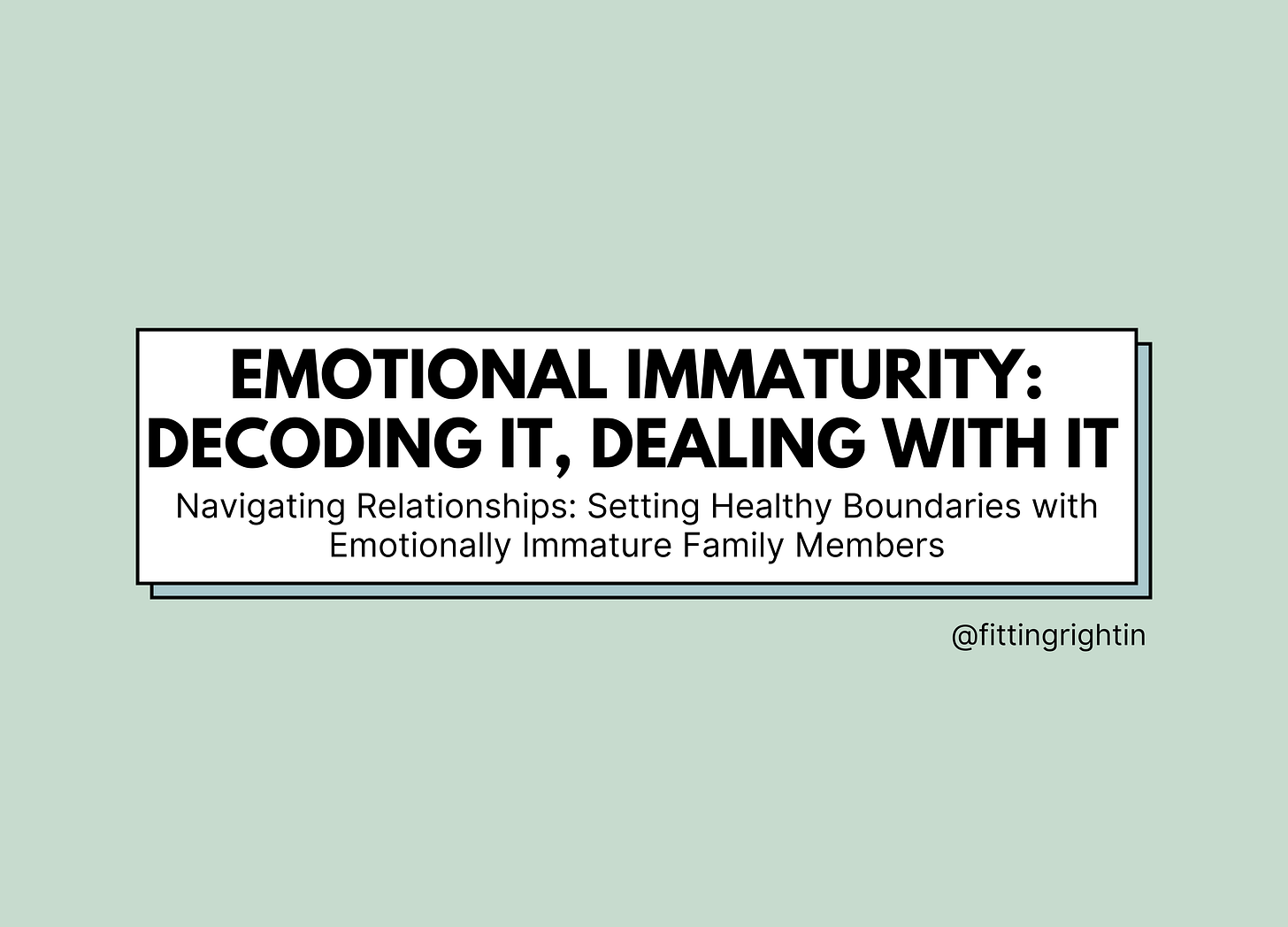Emotional Immaturity: Decoding It, Dealing With It
Navigating Relationships: Setting Healthy Boundaries with Emotionally Immature Family Members
What is Emotional Immaturity?
Emotional immaturity is a term that describes people who have not developed the emotional skills or self-awareness necessary to deal with feelings and interact effectively with others. Emotional immaturity can manifest as a lack of empathy, inability to manage emotions, impulsivity, dependency, or an inability to deal with conflict.
Now, you might be wondering, why is it important to understand emotional immaturity?
The Importance of Understanding Emotional Immaturity
Your understanding of emotional immaturity can transform your relationships and personal growth. Here's why:
Self-awareness: By understanding what emotional immaturity looks like, you can assess your emotional skills and work on areas of improvement.
Relationship Quality: It can help you foster healthier relationships with family members, friends, and colleagues. Understanding emotional immaturity can prevent misunderstandings and resentment.
Setting Boundaries: Emotional immaturity can often lead to toxic or challenging situations. By recognizing these patterns, you can set boundaries to protect your mental and emotional health.
Spotting Emotional Immaturity in Family Members
Spotting emotional immaturity in family members can be a challenging task, as we often grow accustomed to their behaviors or dismiss them as quirks. Here's what to look out for:
Inability to manage emotions: Look out for extreme emotional reactions, frequent mood swings, or overreactions to minor issues.
Lack of empathy: If they rarely show understanding or sympathy towards others' feelings, this can be a sign of emotional immaturity.
Impulsivity: Making rash decisions without considering the consequences is another tell-tale sign.
Dependency: If they constantly rely on others for emotional support or decision-making, they may be emotionally immature.
Avoidance of conflict: If they consistently avoid difficult conversations or disputes, this might be a sign of emotional immaturity.
Remember, these signs are not exhaustive, and everyone may exhibit these behaviors occasionally. However, frequent and consistent patterns could indicate emotional immaturity.
Setting Healthy Boundaries with Emotionally Immature Relatives
Now that we've identified emotional immaturity, let's dive into actionable strategies to set healthy boundaries with emotionally immature relatives.
Understand their limitations: Remember, emotionally immature individuals might not have the same emotional capacity or self-awareness as you do. It's crucial to understand their limitations and manage your expectations accordingly.
Communicate clearly and assertively: Clear and assertive communication is vital. Express your feelings honestly and respectfully. Use "I" statements to communicate your feelings without blaming the other person.
Establish your boundaries: Determine what behaviors you are willing to accept and what you're not. For example, you might decide that you won't tolerate yelling or name-calling.
Reinforce your boundaries: Once you've established your boundaries, reinforce them. If someone crosses a boundary, let them know calmly and assertively.
Seek support if needed: If setting boundaries becomes difficult or leads to conflicts, don't hesitate to seek professional help. A mental health professional can provide guidance and strategies to navigate these situations.
Remember, setting boundaries is not about changing the other person, but protecting your mental and emotional health. It might be challenging, especially with family members, but it's necessary for your well-being.
Wrapping Up
Understanding emotional immaturity is crucial in navigating relationships and personal growth. Identifying signs of emotional immaturity in family members can help you manage your expectations and set healthy boundaries, fostering healthier and more fulfilling relationships. Remember, setting boundaries is not about changing the other person, but it's about preserving your peace and well-being. With these strategies in hand, you're equipped to deal with emotionally immature relatives and create a healthier emotional environment for yourself and those around you.
Everyone is capable of growth, and emotional maturity is not a fixed state. It's a continuous process that evolves with time, experience, and effort. So, whether it's you or someone else showing signs of emotional immaturity, remember that change is possible with dedication and the right support.
Take the time to understand yourself and others, embrace emotional growth, and cultivate relationships that enrich your life. Remember, it's never too late to grow emotionally and foster healthier and more fulfilling relationships. After all, our emotional health is as important as our physical health, and it deserves just as much care and attention.
Remember, seeking professional help in the form of a psychologist or counselor or coach can be invaluable in guiding you through these complex emotional landscapes. A professional can provide a safe space to express your feelings, offer strategies to handle emotionally immature people, and help you develop emotional maturity. So, don't hesitate to reach out if you're feeling overwhelmed.


